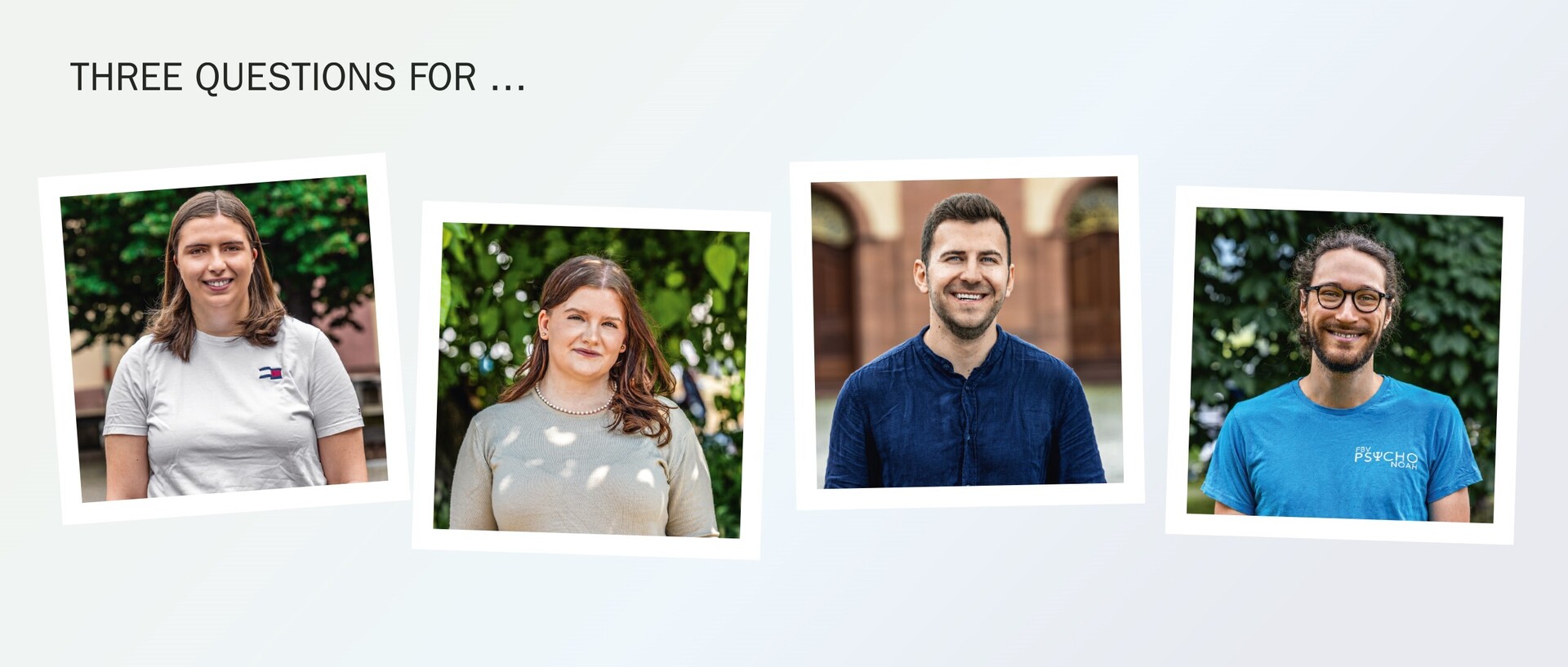Three questions for …
Helping to design new courses, advancing digitalization, or giving students a voice – there are many reasons for student engagement at the University of Mannheim. But who are the people who regularly get involved on behalf of their 12,000 fellow students? And what makes them want to volunteer in committees, schools or departmental student bodies? FORUM asked four students about their motivation.
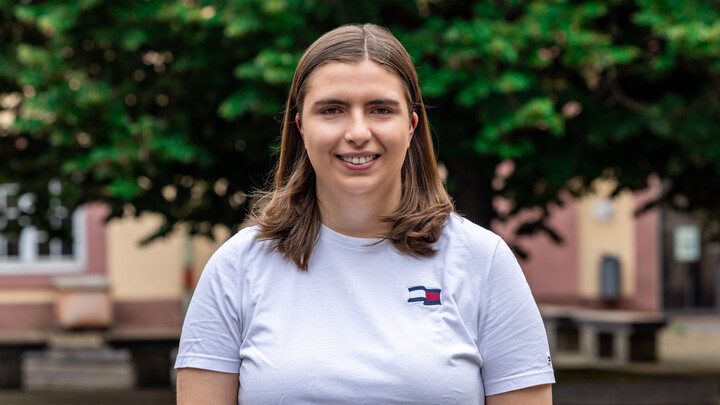
Leonie Sindel
- Age: 23
- Office: Member of the Presidential Board of the Student Parliament
- Term of office: 1 year
- Degree program: Law (integrated
program)
1. What are your responsibilities in the Student Parliament?
The presidential board, which consists of three students, issues invitations to the sessions of the Student Parliament, chairs those sessions and takes the minutes. Moreover, the members of the presidential board represent the Student Parliament in interactions with other university bodies, such as the President’s Office in the Concilium meetings.
2. What do you hope to achieve through your involvement?
My goal is to make students feel their interests are represented in an appropriate way at the university. I want them to know that someone is listening to their concerns and taking action to improve study conditions across the board.
3. Why do you think other students should get involved at the University of Mannheim?
Students should get involved so that many different interests and perspectives are represented at the university. Furthermore, it’s a great opportunity to challenge yourself and learn new skills.
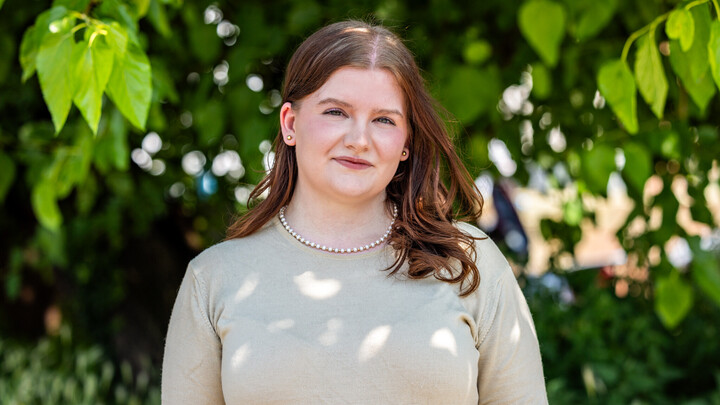
Maja-Stina Köhler
- Age: 22
- Office: Co-Chair of the Departmental Student Committee in Media and Communication Studies and departmental representative
- Term of office: 1 year
- Degree program: Bachelor’s in Media and Communication Studies with a minor in Psychology
1. What are your responsibilities in the departmental student committee?
As co-chairs of the departmental student committee, my fellow student Carolina John and I chair its meetings and are responsible for ensuring that all offices and delegates communicate with each other and report from their respective committees, for example. At the same time, we are in close contact with the university bodies and meet with their representatives on a regular basis to talk about issues such as projects, first-year orientation week and events, or student health and satisfaction. We also serve as a link between students and faculty. In most cases, we are the first go-to persons for prospective students and students in our department.
2. What do you hope to achieve through your involvement?
I think a two-semester term is too short for grand achievements. But that’s not what we’re here for, anyways. Above all, our job is to do good work and be well-organized in projects and upcoming meetings. When we started our term, our top priority was getting many first-year students excited about the departmental student committee as we’re a very small committee and need new members to continue to exist. Apart from that, my personal priority is being a good contact person for both students and faculty. Moreover, I want to raise the visibility of our committee and see us participate in many events. At the end, I want everyone to look back at the past semesters thinking, “We had a great time!”
3. Why do you think other students should get involved at the University of Mannheim?
It’s great fun, you quickly meet new people, and it’s helpful to interact with students in higher semesters – especially in the beginning, when everything is new and unfamiliar. Without us, student interests would not have a voice at the departmental level, and these committees depend on strong student involvement! To be sure, such a role requires a lot of time and work, but you get as much in return, you enjoy great moments with many different people, and you get the opportunity to help shape student life at the university.
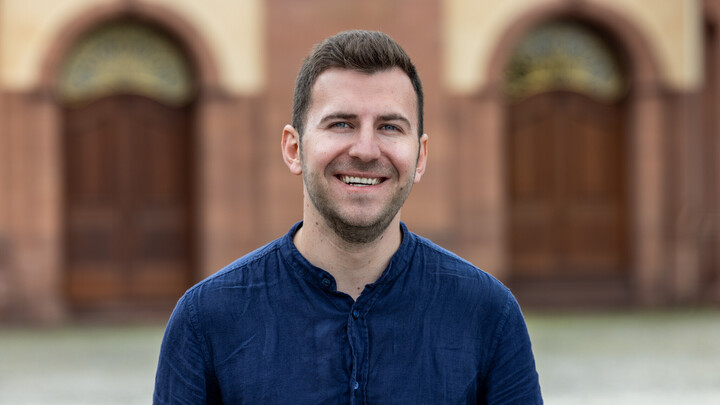
Tim Neubauer
- Age: 26
- Office: Member of the University Supervisory Board
- Term of office: 3 years
- Degree program: Master of Education History and German and Master in Political Science (Extension Subject)
1. What are your responsibilities in the University Supervisory Board?
I represent the interests of students both on the University Supervisory Board and in the joint sessions of the University Supervisory Board and the Senate. My goal is to help design the University of Mannheim’s strategic outlook and development from a student perspective. In addition, I perform all other activities of a supervisory board member.
2. What do you hope to achieve through your involvement?
I want to further develop the University of Mannheim and help set it up in such a way that it is granted the official status of a University of Excellence. To achieve that goal, we must expand our collaborative research portfolio and establish new research units. We should improve the quality of research while working to close the gender gap. More diversity in research will also have a positive effect on the quality of research. What is more, boosting our research capabilities will also have a positive effect on teaching and hence on the student experience at the University of Mannheim. In this context, I would like to use the latest findings in artificial intelligence, digitalization and teaching methodology to further improve teaching without jeopardizing Mannheim as a place of face-to-face learning.
3. Why do you think other students should get involved at the University of Mannheim?
Whether it’s organizing first-year orientation week or negotiating with the President’s Office as chair of the departmental student committee – the University of Mannheim offers a wide range of opportunities for personal growth. Through their voluntary involvement, student organizations and departmental student representatives also contribute to this diversity, which makes studying in Mannheim so unique. It’s something that benefits all students during their time in Mannheim, which is why I believe we should all work to enable the next generation to enjoy the same opportunities that made our time here so unforgettable. Plus, you get to meet lots of great people, which can lead to lifelong friendships.
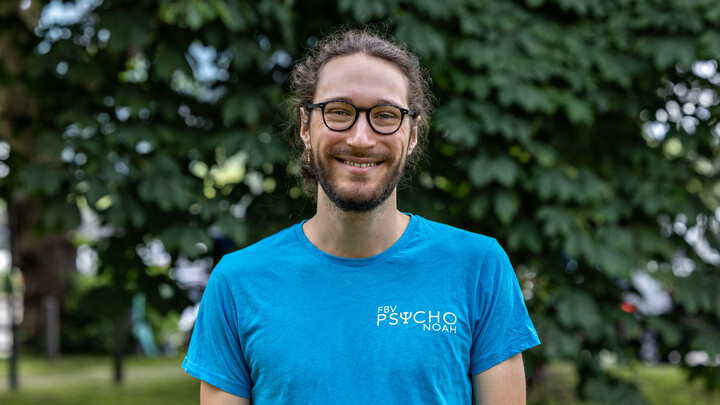
Noah Machunze
- Age: 25
- Office: Student member of the Committee on Student Affairs and Teaching and the School Council of the School of Social Sciences
- Term of office: 1 year
- Degree program: Master of Science in Psychology – Cognitive and Clinical Psychology
1. What are your responsibilities in the Committee on Student Affairs and Teaching and in the School Council?
In the Committee on Student Affairs and Teaching, I add student perspectives and interests to curriculum planning and to revisions of documents that are fundamental to our studies, such as the examination regulations and the internship regulations. In this semester, for example, digital examination formats were made a permanent option in the examination regulations. The School Council then adopts these changes and votes on offices and personnel decisions at the School of Social Sciences. Search committees for new professorships report to the School Council, for example.
2. What do you hope to achieve through your involvement?
I want to enable my fellow students to have flexibility in their studies by designing academic programs in such a way that they allow for part-time work or volunteering. Regarding the curriculum, I try to ensure a broad set of course offerings that maintain their quality as much as possible during the ongoing reforms to psychology education that have been taking place for several years.
3. Why do you think other students should get involved at the University of Mannheim?
If we don’t speak up, we can’t complain afterwards when decisions are made without us. Especially when curricular contents and program structures are subject to dynamic changes, students with their diverse needs must start a dialogue with school administrators. The departmental student committees and bodies serve as a direct channel to communicate with school leadership, and they are also treasure troves of experience and knowledge.
Edited by: Jessica Scholich / August 2024
The interviews for the articles in this section took place in May and June 2024. It is possible, therefore, that officeholders have changed between the editorial deadline and the time the magazine went to print, or that some information is no longer up to date.
